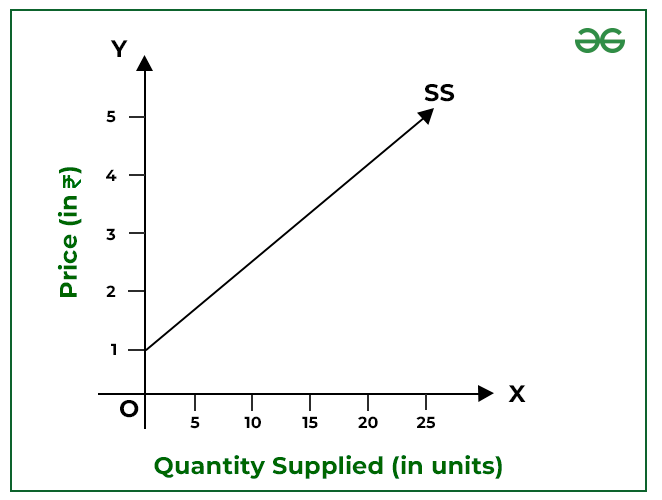Law of Supply: Meaning, Assumptions, Reason and Exceptions
Last Updated :
24 Nov, 2023
What is Law of Supply?
Economists have studied the behaviour of both buyers and sellers. They have discovered the law of supply as a result of their findings. The law of supply describes the relationship between price and amount supplied when all other variables remain constant (ceteris paribus).

Price is a dominant factor in the determination of the supply of a commodity. As the price of a commodity increases, the supply of that commodity in the market also increases and vice-versa. This behaviour of the producers is studied through the law of supply.
Assumptions of Law of Supply
The phrase “keeping other factors constant or ceteris paribus” is used when describing the law of supply. This expression refers to the following presumptions that the law is based on:
- The price of other commodities is constant.
- The state of technology has not changed.
- The price of factors of production is constant.
- The taxation laws remain the same.
- The producer’s objectives are constant.
The Law of Supply can be better understood with the help of the following table and graph.
The above table indicates that when the price of the commodity rises, an increasing number of units are offered for sale.

In the above graph, the rising slope of the supply curve (SS) indicates a clear relationship between price and quantity supplied.
Important points about Law of Supply:
- The law of supply states the positive relationship between price and quantity supplied of a commodity after assuming that the other factors remain constant.
- As the law of supply indicates the direction of the changes in quantity supplied of a commodity and not the magnitude of the change. it is considered as a quantitative statement.
- The law of supply does not establish any proportional relationship between the change in price and the respective change in quantity supplied of the commodity.
- The law of supply is one sided. It is because the law explains only the effect of change in price on the supply of the commodity and not the effect of change in supply on the price of the commodity.
Reason for Law of Supply
The main reasons behind the law of supply are as follows:
1. Profit Motive:
Maximising profits is the primary goal of producers when they supply a good or service. Their profits grow when the price of a commodity rises without a change in costs. Therefore, by increasing production, manufacturers increase the commodity’s supply. On the other hand, as price fall, supply also declines since low price result in lower profit margins.
2. Change in Number of Firms:
When the price of a specific commodity increases, potential producers are encouraged to enter the market and produce the good to make money. The market supply rises as the number of businesses increases. However, once the price begins to decline, some businesses that do not anticipate making any money at a low price may stop production or cut it back. As the number of businesses in the market declines, it decreases the supply of the given commodity.
3. Change in Stock:
When the price of an item rises, sellers are eager to supply additional things from their stocks. However, the producers do not release significant amounts from their stock at a significantly cheaper price. They work on building up their inventory in anticipation of potential price increases in the future.
Exceptions to the Law of Supply

Generally, the slope of the supply curve is upwards, showing that with the rise in the price of a commodity, its quantity supplied also rises. However, there may be some cases when there is no positive relationship between the supply and price of a commodity. These cases are as follows:
1. Future Expectations:
The law of supply is not valid if sellers expect a fall in the price in the future. The sellers will be willing to sell more in this situation, even at a cheaper price. However, if sellers expect an increase in the future price, they will reduce supply to deliver the item later at a higher price.
2. Agricultural Goods:
Agricultural products are exempted from the rule of supply as they are produced in response to climatic circumstances. If the production of agricultural goods is low because of unexpected weather changes, supply cannot be expanded, even at higher prices.
3. Perishable Goods:
Sellers are willing to offer more perishable commodities, such as fruits, vegetables, and other foods, even if prices are dropping. This occurs because sellers cannot keep such things for an extended period.
4. Rare Articles:
The law of supply does not apply to precious, rare, or artistic items. For example, even if the price increases, the number of rare items like the Mona Lisa artwork cannot be increased.
5. Backward Countries:
Due to the scarcity of resources, output and supply cannot be enhanced in economically underdeveloped countries.
Like Article
Suggest improvement
Share your thoughts in the comments
Please Login to comment...